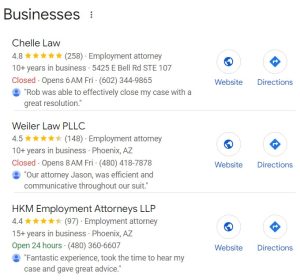Law Firm SEO Guide
 What Is SEO?
What Is SEO?
SEO (Search Engine Optimization) is the strategic process of improving your law firm’s website visibility in search engine results like Google and Bing. This involves researching target keywords, creating high-quality content, earning backlinks from reputable sites, optimizing website structure, and continuously refining your approach to stay ahead of competitors.
Understanding the Value of SEO
If you’re new to SEO, start with step 1 below Developing an SEO Roadmap —a concise guide to help you understand the fundamentals. We also provide additional resources for deeper learning. If you’re familiar with SEO, check out our DIY vs. Hiring an Agency (below) comparison. And if you’re an SEO expert, our SEO Checklist (below) will help ensure you or your agency are covering all essential elements.
Why SEO Matters for Law Firms
SEO delivers measurable results. Many of our clients generate leads daily through organic search and paid advertising. Google remains the dominant search engine in the U.S. and worldwide, making SEO a crucial investment. This guide compiles insights from our 30+ years of experience helping law firms succeed in search rankings.
Key Google Ranking Factors and Best Practices
Google’s ranking algorithm considers hundreds of factors, but these four are the most critical for law firms:
1. High-Quality Content
Content is the foundation of SEO. Your website must provide relevant, well-structured content that aligns with the search queries your potential clients use. The process begins by identifying your core practice areas and understanding how people search for them.
A well-optimized site includes:
✅Practice area pages explaining your services in depth.
✅In-depth content hubs covering key legal topics.
✅Consistent blog posts to establish thought leadership and improve rankings over time.
By consistently publishing valuable content, your site gains credibility, increasing its chances of ranking highly in search results.
2. Backlinks (Inbound Links)
Backlinks act as “votes of confidence” for your site. When other websites link to yours, search engines view your firm as an authority. However, not all links are equal—quality matters more than quantity.
- Established firms may already have natural backlinks from news features, case wins, or legal directories.
- Newer firms must actively build backlinks through reputable directories, local citations, and guest contributions on legal websites.
A strong backlink profile helps improve search rankings and trustworthiness.
3. Website Optimization & Technical SEO
Your website’s structure and technical health play a significant role in SEO performance. Important factors include:
✅Title tags & headings (H1, H2, etc.) for keyword relevance.
✅Fast loading speeds for better user experience.
✅Mobile-friendliness to accommodate search behavior trends.
✅Structured data & XML sitemaps for better indexing.
Some law firms have well-optimized websites that load quickly, pass Google’s usability tests, and provide a seamless experience. Others may need improvement. Use Google PageSpeed Insights to evaluate your site’s performance and make necessary adjustments.
4. User Experience (UX) & RankBrain
Google continuously refines its search rankings based on real user behavior. Factors influencing rankings include:
- Bounce rate: If users quickly leave your site and return to search results, Google assumes your page isn’t helpful.
- Time on site: If users spend several minutes engaging with your content, your ranking may improve.
Google’s RankBrain, an AI-driven system, helps process complex queries and determine which pages are most relevant. By ensuring your website provides value and answers users’ questions effectively, you can improve its visibility in search results.
 Step 1 – Develop a Roadmap
Step 1 – Develop a Roadmap
Key Components of an SEO Roadmap
- Keyword Research
- Content Marketing
- Link Building & Local SEO for Law Firms
- Technical SEO Optimization
- Performance Tracking & ROI Analysis
Step 2 – Keyword Research
Keyword research is the cornerstone of any effective SEO strategy. It involves identifying the specific phrases people use when searching for legal services. Often, the terms potential clients search for are different from what law firms expect, making this step crucial for success.
Why Keyword Research Matters
The research phase helps you:
- Understand your target audience’s needs and search behavior.
- Identify valuable keyword opportunities based on your legal niche and location.
- Choose keywords with sufficient search volume and a reasonable competition level to maximize visibility.
Building a Strong Keyword List
 Start by brainstorming your practice areas and the services you offer. Then, expand your keyword list by incorporating:
Start by brainstorming your practice areas and the services you offer. Then, expand your keyword list by incorporating:
✅Geographic locations where you want to rank (e.g., “San Francisco emploment lawyer”).
✅Industry-specific terms like “lawyer,” “attorney,” and “law firm” to make your keywords more relevant.
Using merge word functions can generate multiple keyword variations quickly, giving you a broader set of potential search terms.
Using Keyword Research Tools
Prioritizing Keywords
After evaluating keyword data, the next step is to refine and prioritize your list:
✅Primary Keywords: The main focus of your SEO campaign. These should align with your firm’s core services and have significant search volume.
✅Secondary Keywords: Important but slightly less competitive or relevant than primary keywords. These support your SEO efforts over the long term.
✅Tertiary Keywords: Niche or long-tail keywords that help expand your reach but may not be immediate priorities.
This structured approach ensures that your campaign remains focused on the most impactful search terms while still allowing for future growth.
Expanding Your Research for Maximum Impact
While this basic keyword research process is quick and effective, more advanced techniques can further refine your strategy:
✅Long-tail keyword analysis to capture highly specific client searches.
✅Competitor keyword analysis to identify gaps and opportunities.
✅Seasonal keyword trends to capitalize on search fluctuations throughout the year.
Integrating Keywords into Your Website
Once you’ve identified the right keywords, the final step is optimizing your website content. This includes:
- Aligning existing pages with target keywords.
- Creating new content that strengthens keyword relevance.
- Improving internal linking to reinforce keyword themes.
By following this structured keyword research process, your law firm can build a strong SEO foundation, ensuring that your website ranks higher and attracts more potential clients searching for legal services.
Step 3 – Content Marketing & On-Page Optimization
Home Page Writing
Your home page is often the first point of contact for potential clients, making it one of the most important pages on your website. It should provide a clear, engaging, and SEO-friendly overview of your firm, emphasizing your services, expertise, and location.
To maximize impact:
✅Naturally incorporate relevant keywords without overstuffing.
✅Keep the content concise yet informative, ensuring visitors quickly understand your firm’s value.
✅Focus on user experience (UX) first—polishing the content before refining the page’s design.
Core Content Writing
Core content refers to the practice area pages that define your legal services. Each service should have a dedicated, in-depth page optimized for specific keywords. Google rewards comprehensive, well-structured content, so each page should:
- Match user intent by addressing common legal concerns.
- Include substantial text (at least 2,000 words for competitive topics).
- Be well-organized, making navigation and readability easy.
Blogging: A Must-Have Strategy
Regularly publishing blog posts is essential for building authority, driving organic traffic, and engaging potential clients. Blogging allows you to:
- Answer common legal questions.
- Share legal insights and case studies.
- Target long-tail keywords that might not fit on core pages.
For consistent growth, a structured content calendar with a set number of blog posts per month is ideal.
Our Process
We create a structured keyword mapping sheet that lists all pages on your website and aligns each one with specific target keywords. Every page is assigned a primary keyword to focus on, ensuring it ranks effectively for relevant searches. If applicable, we also include secondary keywords or related search terms to strengthen the page’s relevance. Each page must have a clear focus, avoiding keyword overlap and ensuring a well-optimized content strategy.
 Structuring Content for SEO & User Experience
Structuring Content for SEO & User Experience
A well-structured website helps both search engines and users navigate your content effortlessly.
Key strategies include:
- Organizing content into clear categories and ensuring a logical site structure.
- Matching keywords to specific pages, ensuring each page has a primary keyword focus and, when relevant, secondary keywords.
- Ensuring internal linking between related content to improve search engine crawling and user engagement.
Content Length & Keyword Integration
Content length depends on industry competition. While shorter pages may work for less competitive topics, studies show that pages ranking on Google’s first page average around 1,500 words. For highly competitive legal terms, consider creating:
- Ultimate guides (2,500-5,000+ words) for highly competitive practice areas.
- Topic clusters (e.g., separate pages for probate vs. estate planning).
When writing, strike a balance between depth and keyword integration:
- Avoid keyword stuffing, but naturally weave keywords throughout the content.
- Answer common client questions by researching Google’s “People Also Ask” and related search queries to optimize for featured snippets.
On-Page SEO Fundamentals
To maximize visibility, implement essential on-page SEO techniques:
- Title Tags & Meta Descriptions – Optimize for keywords and click-through rate.
- Headings (H1, H2, H3, etc.) – Structure content clearly for readability.
- Internal Links – Guide users to related content and strengthen SEO.
- Mobile Optimization & Page Speed – Ensure fast-loading, mobile-friendly pages.
Step 4 – Link Building For Lawyers
Link building is the process of acquiring high-quality backlinks from reputable websites. These backlinks signal to search engines that your site is authoritative and trustworthy, helping to improve rankings and increase organic traffic. While content is a key ranking factor, Google also evaluates a website’s authority based on backlinks—external sites linking to your pages.
A well-executed link-building strategy ensures that your law firm remains competitive in search rankings.
How Law Firms Can Build Links

Law firms can secure backlinks through various methods, including:
- Legal directories (e.g., Avvo, Justia, FindLaw)
- Business directories (e.g., BBB, Chamber of Commerce)
- Local listings (Google Business Profile, Yelp)
- Guest blogging & content syndication
- Media mentions & PR campaigns
- Social media citations
- Sponsoring local or national events
- Engaging with legal bloggers & industry influencers
- Creating high-quality, linkable resources
The key is to focus on quality over quantity—not all links are beneficial, and low-quality backlinks can harm your rankings.
What Types of Backlinks to Target
Not all backlinks are created equal. To ensure your link-building efforts are effective, consider the following:
- Relevance – Does the linking website relate to your legal niche or location?
- Domain Authority (DA) – Is the referring website considered a trusted source by search engines?
- Organic Traffic – Does the linking site attract real users?
- Link Type – A do-follow link passes authority, while a no-follow link may still provide indirect value.
Avoid spammy or low-quality backlinks, as they can lead to a Google penalty or negatively impact rankings.
Directories for Law Firms
 Legal and business directories are an essential foundation for a law firm’s online presence. These directories help improve visibility, provide referral traffic, and contribute to your site’s backlink profile.
Legal and business directories are an essential foundation for a law firm’s online presence. These directories help improve visibility, provide referral traffic, and contribute to your site’s backlink profile.
When listing your firm, ensure that:
✅Your contact information (NAP: Name, Address, Phone Number) is consistent across all platforms.
✅You choose reputable, high-authority directories over spammy, low-quality ones.
✅You include detailed descriptions, logos, and links to your website.
Some recommended legal directories include:
- Avvo
- Justia
- FindLaw
- Martindale-Hubbell
- Lawyers.com
For general business directories, consider:
- Google Business Profile
- BBB (Better Business Bureau)
- Chamber of Commerce
- Yelp
Some directories may charge a fee for premium features, but they can be worthwhile for visibility and authority.
Guest Blogging & Article Submission
Publishing content outside your website helps build authority and generate backlinks. Law firms can contribute articles to:
- Legal industry blogs & online publications (e.g., HG.org, Above the Law)
- Local news websites & business journals
- General content platforms (e.g., Medium, Patch)
When guest blogging, ensure that:
✅ The publication is relevant to your legal practice.
✅ The content is high-quality, informative, and valuable.
✅ You include a backlink within the author bio or article.
Many high-quality sites have strict editorial guidelines, so be prepared to submit well-researched and professionally written content.
Outreach & Pitching for Backlinks
Creating valuable content on your website is only part of the equation—you must also actively promote it. Outreach efforts help attract backlinks by getting your content in front of the right audience.
How to Conduct Outreach:
✅ Manual Research & Outreach: Use Google search operators to find websites covering topics related to your legal expertise. Reach out and offer a resource, guest post, or expert insight.
✅ Media & PR Mentions (HARO): Sign up for Help a Reporter Out (HARO) or similar journalist-query platforms. This allows you to provide expert legal insights in exchange for a mention and backlink.
✅ Networking with Legal Influencers: Build relationships with industry professionals, attorneys, and bloggers who may naturally link to your content.
Link Building Practices to Avoid
While link building is essential for SEO, certain tactics can do more harm than good. Google penalizes manipulative link-building practices, which can lead to ranking drops or even deindexing.
🚫 Avoid the following black-hat link-building techniques:
❌ Link Farms & Private Blog Networks (PBNs): These are groups of sites created solely to exchange or sell backlinks—Google actively devalues them.
❌ Comment Spam: Leaving irrelevant links in blog comments was once a common tactic but is now considered spammy and ineffective.
❌ Low-Quality Directories & Article Sites: Not all directories are valuable—avoid those that seem spammy or irrelevant.
❌ Reciprocal Linking Schemes: Exchanging links purely for SEO purposes (e.g., “You link to me, I’ll link to you”) is against Google’s guidelines.
Step 5 – Technical SEO for Law Firm Websites
Technical SEO is the foundation of a well-optimized website. Without it, search engines may struggle to crawl, index, and rank your content, leading to poor visibility, lower rankings, and a frustrating user experience. For law firms, technical SEO ensures that your website is fast, mobile-friendly, easy to navigate, and optimized for search performance.
Core Technical SEO Elements
1. Site Structure & URL Optimization
A well-structured website makes it easier for both users and search engines to find important pages. Best practices include:
✅Short, descriptive URLs (e.g., yourlawfirm.com/personal-injury/ instead of yourlawfirm.com/p123?id=5)
✅ Logical site hierarchy with parent and child categories for better organization
✅ Dynamic XML sitemap that automatically updates as new pages are added
Modern CMS platforms like WordPress often handle these automatically, but manual checks are still necessary to ensure proper indexing.
 2. HTML Meta Tags & Structured Data
2. HTML Meta Tags & Structured Data
Your website must include properly configured:
✅Title tags & meta descriptions to improve click-through rates
✅Header tags (H1, H2, H3, etc.) for clear content structure
✅Alt text for images to improve accessibility and SEO
✅Schema markup to help Google understand your site’s content
Despite using modern themes or templates, many WordPress sites contain bloated, inefficient code. Minimizing unnecessary plugins and optimizing code will improve website performance.
Technical SEO Checklist
📌 Mobile Optimization: Your site must be fully responsive on all devices
📌 Fast Load Speed: Passes Core Web Vitals for optimal performance
📌 SSL Certificate Installed: Secure HTTPS encryption for all pages
📌 No Broken Links: Internal & external links should function properly
📌 No Redirect Chains: Avoid unnecessary 301 redirects
📌 Custom 404 Error Page: Guides users when they reach a broken link
📌 Unique Titles & Meta Descriptions: No duplicates across pages
📌 Alt Tags for Images: Ensures accessibility & image search ranking
📌 Schema Markup: Helps Google understand business info & key content
📌 Robots.txt & XML Sitemaps: Configured correctly for search engines
📌 Google Analytics & Search Console: Properly set up for monitoring
User Experience (UX) & SEO Metrics
Google monitors user behavior to assess a site’s relevance and quality. Your law firm’s website should be easy to navigate, engaging, and informative.
Key metrics to analyze in Google Analytics:
✅Sessions – Total visitor traffic
✅Pages Per Session – Average number of pages viewed per visit
✅New Users – How many first-time visitors your site attracts
✅Average Session Duration – Ideal time spent per visit (>30 seconds)
✅Engagement Rate – Ideally over 50%
✅Conversion Rate – Percentage of visitors taking action (e.g., contact form submission)
💡 Tip: Identify pages with high traffic but low engagement and improve them with better content, structure, or calls to action.
Managing Multiple Domains & Redirects
If your law firm has multiple domains, they should all redirect to a single primary domain using a 301 redirect. This:
✅Consolidates your site’s SEO authority
✅Prevents duplicate content issues
✅ Directs all traffic to your preferred domain
Older domains with high inbound links should be prioritized for redirection.
Website Speed & Core Web Vitals
A slow-loading website frustrates users and harms search rankings. Google considers Core Web Vitals an official ranking factor, measuring:
✅Largest Contentful Paint (LCP): Measures loading time (goal: <2.5s)
✅Interaction to Next Paint (INP): Measures responsiveness (goal: <200ms)
✅Cumulative Layout Shift (CLS): Measures visual stability (goal: <0.1)
✅How to Optimize for Speed:
✅Optimize images (compress large files)
✅Minimize unnecessary plugins (especially on WordPress)
✅Enable caching & content delivery networks (CDNs)
✅Use lightweight themes & remove bloated code
Use Google PageSpeed Insights to test your site and follow its recommendations.
Mobile-First Indexing: Why It Matters
Google prioritizes mobile versions of websites when indexing content. If your law firm’s website isn’t mobile-friendly, it will:
❌ Rank lower in mobile search results
❌ Provide a poor user experience
❌ Miss out on valuable leads
Key Mobile Optimization Steps:
✅ Ensure text is readable without zooming
✅ Use clickable, well-spaced buttons
✅Prevent horizontal scrolling issues
✅Use responsive design for all devices
Most traffic now comes from mobile users. A mobile-friendly site is no longer optional—it’s mandatory.
XML Sitemaps & Search Engine Submission
 An XML sitemap tells search engines which pages to index. It should:
An XML sitemap tells search engines which pages to index. It should:
✅List all key pages of your website
✅Include last modified dates for content updates
✅Be submitted to Google Search Console
Tools like Yoast SEO or All-in-One SEO for WordPress automatically generate dynamic XML sitemaps that update as your content changes.
Structured Data & Schema Markup
Adding structured data (Schema.org markup) helps Google understand your content better.
Benefits of Structured Data:
✅Enhances Google search snippets (e.g., FAQs, reviews, events)
✅Helps search engines categorize your site content
✅Increases chances of appearing in rich results
Common schema types for law firms:
✅ Legal Services Schema (identifies your firm as a legal entity)
✅ FAQ Schema (enhances visibility of Q&A content)
✅ Review Schema (displays star ratings in search results)
✅ Article Schema (for legal blogs & news)
💡 Tip: Use Google’s Rich Results Test to verify proper schema implementation.
Tracking SEO Performance with Analytics
The key to long-term SEO success is continuous monitoring & improvement.
Essential SEO Tracking Tools:
✅Google Analytics – Monitors visitor behavior & conversions
✅Google Search Console – Tracks search rankings & site performance
✅SEO Rank Tracking Software – Measures keyword positioning
✅Heatmaps & User Session Recordings – Identifies user experience issues
📌 What to Track:
- Keyword rankings – Monitor position changes for target search terms
- Traffic trends – Identify seasonal fluctuations
- Conversion tracking – Measure form submissions, calls, and leads
By analyzing these insights, your firm can refine its SEO strategy, improve weak pages, and maximize conversions.
Step 6 – Local SEO for Law Firms
 Local SEO focuses on optimizing your law firm’s online presence to attract clients within a specific city, state, or region. The primary goal is to rank highly in Google’s local search results and Google Maps (Map Pack)—which can significantly boost visibility and client inquiries.
Local SEO focuses on optimizing your law firm’s online presence to attract clients within a specific city, state, or region. The primary goal is to rank highly in Google’s local search results and Google Maps (Map Pack)—which can significantly boost visibility and client inquiries.
Currently, Google’s Map Pack displays three top businesses for local searches. Ranking in this highly competitive space requires a combination of:
✅Optimized business citations (NAP: Name, Address, Phone Number)
✅Proximity to the target city or service area
✅High-quality Google reviews
✅Relevant website content
✅Strong backlink profile
How to Optimize Your Law Firm for Local SEO
1. Claim & Optimize Your Google Business Profile (GBP)
One of the most critical steps for local SEO is claiming and fully optimizing your Google Business Profile (formerly Google My Business).
📌 Key Steps to Optimize GBP:
✅ Claim and verify your listing at Google Business Profile
✅ Use your official law firm name (consistent with your website and citations)
✅ Enter a complete & accurate address (exact match across all platforms)
✅ Choose the right legal service categories (e.g., Personal Injury Attorney, Criminal Defense Lawyer)
✅ Include your phone number & website link
✅ Add a detailed business description using relevant keywords
✅ Upload high-quality images (office, attorneys, team, logo)
✅ Set up Google Business Profile Posts to share updates and content
2. Get More High-Quality Reviews
Google reviews play a major role in local rankings and client trust. Positive reviews increase your credibility and conversion rates.
📌 How to Get More Reviews:
✅Request reviews from satisfied clients via email or text
✅ Use Google’s review short link to make it easy to leave a review
✅ Respond professionally to all reviews (positive & negative)
✅ Avoid fake or incentivized reviews, as Google penalizes them
💡 Tip: Consistent, genuine client reviews can improve your Map Pack ranking.
3. Build Local Citations & Directory Listings
Citations refer to online mentions of your law firm’s Name, Address, and Phone Number (NAP) on business directories, legal directories, and social media platforms.
📌 Where to List Your Law Firm:
✅Legal directories: Avvo, Justia, FindLaw, Martindale-Hubbell
✅General business directories: Yelp, BBB, Chamber of Commerce
✅Local directories & government listings
⚠ Warning: Avoid duplicate or inconsistent citations—Google may penalize incorrect or conflicting NAP information.
4. Optimize Website Content for Local SEO
To strengthen your local search presence, your law firm’s website should include:
✅City-specific practice area pages (e.g., “Miami Personal Injury Lawyer”)
✅Location-based keywords throughout content (without keyword stuffing)
✅Client testimonials & case results on location pages
✅Localized blog posts covering legal updates & community news
💡 Tip: Google prefers high-quality, relevant content over keyword stuffing. Make your pages informative, not just keyword-focused.
5. Build Local Backlinks
Backlinks from local sources improve credibility and rankings.
📌 Ways to Earn Local Backlinks:
✅ Sponsor local events, charities, or legal organizations
✅ Guest post on local news websites or legal blogs
✅ Get listed in local bar associations & networking groups
✅ Engage with local press & PR opportunities
Common Local SEO Mistakes to Avoid
🚫 Duplicate Google Business Profiles – Can confuse search engines & dilute rankings
🚫 Inconsistent NAP details – Causes ranking issues & trust concerns
🚫 Fake or incentivized reviews – Google can remove them & penalize your listing
🚫 Ignoring negative reviews – Always respond professionally to maintain credibility
Step 7 – Social Media Strategy for Law Firms
Social media is a powerful tool for building brand awareness, engaging with potential clients, and driving traffic to your law firm’s website. Establishing a strong social media presence allows you to connect with your audience, showcase your expertise, and enhance your firm’s credibility.
Choosing the Right Platforms
Your law firm should maintain an active presence on key social media platforms:
✅ Facebook – Ideal for community engagement, sharing blog posts, and client success stories
✅ Twitter/X – Great for legal news updates, quick insights, and networking with industry professionals
✅ LinkedIn – Best for professional networking, industry thought leadership, and firm updates
📌 Additional Platforms (Based on Your Goals & Bandwidth):
✅Instagram – Great for showcasing office culture, team highlights, and legal tips through visuals
✅TikTok – Engaging platform for quick legal insights, FAQs, and educational short-form videos
✅YouTube – Best for long-form legal content, case studies, and explainer videos
💡 Tip: Choose platforms based on where your potential clients are most active.
Content Strategy & Posting Consistency
A consistent posting schedule helps keep your audience engaged and enhances your firm’s visibility. Your social media content should include:
📌 Engaging Posts to Share:
✅Blog posts & legal guides – Drive traffic to your website
✅Legal updates & industry news – Keep your audience informed
✅Client testimonials & case results – Build credibility and trust
✅Firm news & achievements – Showcase milestones and recognitions
✅Educational videos & FAQs – Position yourself as an expert
✅Live Q&A sessions – Engage directly with potential clients
💡 Tip: Posts should be a mix of informational, promotional, and interactive content to keep your audience engaged.
Encouraging Engagement & Interaction
Social media isn’t just about posting content—it’s about building relationships.
📌 Boost Engagement by:
✅ Encouraging comments, likes, and shares
✅Replying to messages & comments in a timely manner
✅ Interacting with clients, businesses, and industry leaders
✅Running polls, Q&A sessions, and giveaways to spark engagement
💡 Tip: Engagement signals credibility to social media algorithms, increasing visibility.
Streamlining Social Media Management
Since managing social media can be time-consuming, we recommend:
📌 Efficient Social Media Management Tips:
✅Plan posts in advance using a content calendar
✅ Use scheduling tools like Hootsuite, Buffer, or Sendible to automate posts
✅ Assign a team member to monitor & respond to interactions
✅ If short on time, consider outsourcing to a social media management team
💡 Tip: A dedicated strategy ensures your firm remains active and engaged without overwhelming your team.
Step 8 – SEO Reporting & Consultation
SEO is a collaborative process, and consistent communication between your law firm and your marketing team is crucial for success. While SEO analytics provide valuable insights, real-world feedback from your firm is equally important. Regular consultation ensures that marketing strategies are aligned with actual client conversions, not just traffic metrics.
Why Reporting & Consultation Matter
📌 Key Benefits of Regular SEO Consultations:
✅ Ensures marketing efforts align with your firm’s business goals
✅ Helps SEO teams focus on traffic that converts into real clients
✅ Allows for data-driven decision-making & campaign adjustments
✅ Encourages proactive strategy shifts to maximize return on investment (ROI)
When SEO teams rely only on analytics, they may optimize for leads that don’t translate into clients. That’s why your direct input on what traffic leads to actual consultations is essential.
SEO Reporting: Measuring Campaign Success
A comprehensive SEO report should provide a clear, actionable overview of campaign performance.
Essential SEO Metrics to Track:
✅ Keyword Rankings – Monitor how target search terms are performing
✅ Traffic Sources & Attribution – Breakdown of organic, paid, and referral traffic
✅ Link Building Data – Backlinks from other domains & citations from directories
✅ Google Business Profile Performance – Clicks, calls, and customer reviews
✅ Conversion Tracking – Leads, contact form submissions, and phone calls
✅Channel breakdown – Where visitors are coming from
✅Session graphs & user behavior – Time spent on site, pages visited
✅Conversion rates – Percentage of visitors turning into potential clients
💡 Tip: Reports should go beyond just numbers—they should tell a story about what’s working and what needs improvement.
The Importance of Regular Check-Ins
Frequent strategy meetings ensure that the marketing team can adjust efforts based on your firm’s real-world client feedback.
📌 Best Practices for Effective SEO Consultation:
✅Monthly or bi-weekly meetings to review performance & align strategies
✅Collaborative goal-setting – Prioritize efforts that drive actual client conversions
✅Quick response time – Address issues like declining rankings or low engagement
✅Adjustments based on firm feedback – Focus SEO efforts on high-value cases & practice areas
💡 Tip: Agility is key. If a strategy isn’t delivering results, regular consultations allow for faster course correction and data-backed improvements.
Why Law Firm SEO is Important
Surprisingly, not every law firm needs an extensive SEO campaign. At Inherent, Inc., we believe in transparency—if your website is already well-optimized, regularly updated with quality content, and has strong backlinks, then you may only need minor SEO adjustments.
However, if your law firm’s website lacks structure, has little to no content, and struggles to attract backlinks, then investing in SEO is essential to improving your online visibility and client acquisition.
DIY SEO for Law Firms
If your law firm already has a solid foundation, you may be able to handle SEO in-house with dedicated time and effort.
📌 Key DIY SEO Tasks:
✅Writing high-quality content regularly
✅Building backlinks from reputable legal directories
✅Optimizing site structure & mobile-friendliness
✅Improving page speed & technical SEO
✅Implementing an outreach strategy for link-building
💡 While SEO is something you can do yourself, it requires consistency, research, and expertise to stay ahead of the competition.
Hiring an SEO Agency for Your Law Firm
For many law firms, their website is the most important marketing asset. Even with top-tier legal expertise, if your site isn’t ranking on Google’s first page, potential clients may never find you.
📌 Reasons to Hire an SEO Agency Like Inherent, Inc.:
✅Poor Rankings – Your firm appears on page two or lower in search results.
✅New to SEO – You want to start strong with best practices.
✅Need Growth Beyond Referrals – SEO expands your reach beyond word-of-mouth.
✅Google Penalties – A sudden ranking drop may require backlink cleanup, content revisions, or disavow file management.
✅Budget Wastage – You’re spending money on marketing but not seeing results.
✅Too Busy to Manage SEO – Your time is better spent practicing law, not handling content and backlinks.
How an SEO Agency Can Help
Depending on your situation, an SEO strategy may involve:
✅ Gaining more high-authority backlinks
✅ Expanding directory listings & optimizing Google Business Profile
✅ Publishing comprehensive legal guides & high-value content
✅ Reorganizing site structure for better user experience & speed
✅ Ensuring mobile-friendliness & Core Web Vitals compliance
At Inherent, Inc., we tailor SEO strategies to meet the unique needs of your law firm, ensuring that your website ranks higher, attracts more leads, and converts visitors into clients.
🚀 Need help optimizing your law firm’s website? Contact Us to see how we can drive results for your firm today!

